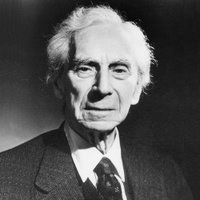Russell At the Dock
 My friend Charlie, an atheist, has expressed concern regarding my post on John Cage. I thought it would be more interesting if I responded publicly.
My friend Charlie, an atheist, has expressed concern regarding my post on John Cage. I thought it would be more interesting if I responded publicly.Charlie disagrees with my claims that atheism takes courage, that the atheist's universe is purposeless and random, and that atheism necessitates the embracing of despair. "You have no reason to say this," he writes. He thinks my existential assesment of atheism cannot be supported.
Well, I'll mention two things in my defense at this juncture. First, I used to be an atheist, and so I am acquainted with the existential implications. Perhaps I am alone in my experience. But then I turn to Bertrand Russell, one of the patron saints of atheism in the 20th century. He puts it this way:
That Man is the product of causes which had no prevision of the end they
were achieving; that his origin, his growth, his hopes and fears, his loves and
his beliefs, are but the outcome of accidental collocations of atoms; that no
fire, no heroism, no intensity of thought and feeling, can preserve an
individual life beyond the grave; that all the labours of the ages, all the
devotion, all the inspiration, all the noonday brightness of human genius, are
destined to extinction in the vast death of the solar system, and that the whole
temple of Man's achievement must inevitably be buried beneath the debris of a
universe in ruins--all these things, if not quite beyound dispute, are yet so
nearly certain, that no philosophy which rejects them can hope to stand. Only
within the scaffolding of these truths, only on the firm foundation of
unyielding despair, can the soul's habitation henceforth be safely built.*
I can call other witnesses if needed -- Camus, Sartre, Nietzsche, et al. The greatest philosophical atheists understand the terrible truth, and have the courage to face it. For this, I admire them.
*From A Free Man's Worship, 1903. (5th paragraph down on this internet version.)


0 Comments:
Post a Comment
<< Home